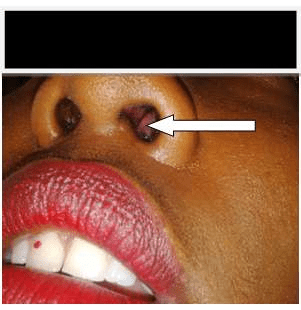
Nasal polyps are soft, painless, noncancerous growth lining in the nose. They occur in areas where the upper sinuses drain into the nose. Polyps vary in size, they may be yellowish, brown, or pink. They have a shape like teardrops. As they grow, they eventually look like grapes on a stem. Polyps may grow in one or both nostrils. However, they can grow on their own or in clusters. Large polyps can cause breathing difficulties and can affect the patient’s sense of smell. They may block the sinuses and cause problems, such as regular infections.
Symptoms.
Nasal polyps are associated with irritation and swelling of the lining of the Nasal passages. However, it lasts for more than 12 weeks. So, it’s possible to have chronic sinusitis without Nasal polyps. Symptoms related to Nasal polyps are;
Loss of sense of taste.
Headache.
Pain in the upper teeth.
Snoring.
Frequent nosebleeds.
- Robbin Simmons, Age, Edu, Children, Wife, Net Worth.
- Olivia Flowers Bio-Southern Charm, Children, Age, Husband.
- Who is Mwangi Kiunjuri, family, and politics?
- Mbusi-Radio Jambo presenter real name, age, education, wife
- Tavares Jones bio-wiki, age, children, wife, net worth, career.
- Al Gore age, family, wife, children, career, books, net worth.
- Joe Nyutu Biography, Age, Family, Education, Career, Net worth
Absent sense of smell.
Postnasal drip.
A running nose.
Persistent stiffness.
Causes.
Polyps develop because the mucous membranes lining of the nose change. Therefore, it develops inflammation features swelling redness, and fluid buildup. During an infection, the nasal mucosa becomes swollen with prolonged irritation. The mucosa may form a polyp. A polyp is around growth that can block nasal passages. Although some people can develop polyps with no previous nasal problems, there is a trigger for developing polyps. These triggers include
Chronic Asthma.
Cystic fibrosis.
However, there may be a hereditary tendency for some people to develop polyps. This may be due to the way their genes cause their mucosa to react to inflammation.
Treatment.
Steroids. The doctor may prescribe a steroid spray, which will shrink the polyps by reducing inflammation. However, this treatment is more common for patients with one or more small polyps.
Steroids tablets. Steroids tablets can be taken along with a nasal spray. Therefore, steroid tablets are very effective at shrinking polyps. There is a risk of more serious side effects such as weight gain.
Surgery. This is used if the polyps are very large, or if the patient has not responded well to other treatments.
Other medication. This may be given to treat conditions that are making the inflammation worse. Additionally, examples include antifungal drugs, antibiotics, and antihistamines.
- Bay head elementary school history, enrolment, programs offered.
- List of Accredited Private Universities in Kenya
- List of best private primary schools in Kirinyaga County.
- A list of special secondary schools, and contacts.
- What is the history of Kenyatta University?
- How is The Lenana Boy school and location?
- Kenya Medical Training College, courses, requirements.